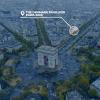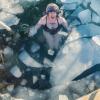
Designed for Life : Denmark’s Design Heritage
In Denmark, design is for life, and for everyone. Whether that’s in what you wear on the street, how the buildings around you function or what the chair you sit in feels like, a few key themes run through the Danish approach to design.
A Pavilion Made of Chairs
We’re not done with designing chairs: just take our Denmark Pavilion as an example. A fully recyclable event pavilion, it is created from 600 chairs made from recycled Carlsberg kegs, old fishing nets, and discarded wood. Initially intended for The Denmark Pavilion during the Tokyo Olympics 2020, the chairs ended on quite a different journey thanks to COVID-19 and have since offered literal seats at the table of New York Climate Week, Milan Design Week and Roskilde Festival. And now, you can witness the chairs returning to their original purpose, as the foundation of The Denmark Pavilion in Paris 2024. After the Olympic Games, they will find a new home at the Fondation Danoise – a base for Danish students and researchers, offering a unique combination of Danish hygge and cosmopolitan diversity in the heart of Paris.
The interior and exhibition architecture has been created by Copenhagen-based architects BRIQ, along with the concept and content creation, while the structure was designed by Danish architects Lendager Group, who specialise in sustainable architecture and urban planning.
Design Creates Culture
Another of Denmark’s key design exports is architecture. Copenhagen is the current World Architecture Capital, a title given by UNESCO for its human-centred, sustainable focus. Just a couple of examples of its unique architectural style are Urban Rigger, a set of 72 floating container apartments built by Bjarke Ingels Group in Copenhagen, and Living Places. Urban Rigger was created as an alternative to traditional buildings on land in response to the shortage of affordable housing in our cities; Living Places Copenhagen is a collection of seven prototype houses that show that it is possible and affordable to create sustainable and beautiful buildings with a lower-than-average CO2 footprint.
Finally, because Danish designers like to add a sense of play wherever they can, its playground architects Monstrum are known the world over for its outrageously artistic and fun playground designs, playscapes that could be entire castles, gigantic peacocks or whales, designed to promote imaginative play in children of all ages. We’ve also got a ski slope on top of a waste management building, Copenhill, which tell a story of how modern municipal buildings can be so clean that they can co-exist with leisure spaces. Urban planning has long been a strong point of Denmark’s architects, and this idea shapes a future where cities don’t have to hide municipal buildings on the outskirts.

Photo:Municipality of Copenhagen
Facts about Danish Design
|
EDITOR'S NOTESThe Denmark Pavilion is open to the public 26 July–11 August; 11am-10pm (except August 1, from 11:00 to 16:00). Admission is free. WHAT'S ON To stay updated re. What’s On at The Denmark Pavilion, go to: denmarkpavilion.com SoMe hashtag: #denmarkpavilion2024 FURTHER INFO / CONTACT INFORMATION Media attending the Olympic Games are more than welcome to visit The Denmark Pavilion and to contact the press team for further details. Please reach out to PR & Press Manager Lasse Emil Kristiansen at laekri@visitdenmark.com or +4531415390. WANT TO KNOW MORE? Creative Denmark is a great place to start. A not-for-profit, publicprivate partnership, it creates awareness about Danish creative strongholds internationally and the potential of Danish creativity in solving global challenges. HIGH RES. IMAGES TO GO Download images and videos from The Denmark Pavilion in Paris and from our extensive Denmark media database here: https://www.visitdenmark.com/denmark-pavilion/images ABOUT THE DENMARK PAVILION During the Paris Olympics, visitors from around the world can enjoy a free visit to a small piece of Denmark at Champs-Élysées. Here, they can encounter Danish ideas that contribute to creating a better life and a better world. VisitDenmark, in collaboration with the Ministry of Industry, Business and Financial Affairs, leads this initiative, which is supported by Realdania, the Consul George Jorck and Wife Emma Jorck Foundation, and The Trade Council. |

Kommunikations- og udviklingsdirektør

PR & Press Manager, Italy & France
PR & Press Manager, UK





